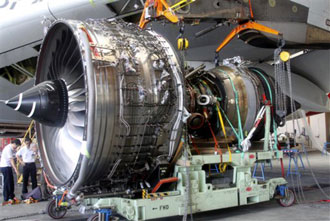Airbus to Replace Up to 40 Superjumbo Engines
Up to half of the Airbus superjumbo engines of the type that disintegrated in flight on a Qantas plane may need to be replaced in the fleets of carriers from Australia, Singapore and Germany, the Qantas chief executive said Thursday.
Australia’s Qantas, Singapore Airlines and Germany’s Lufthansa fly A380s powered by four giant Rolls-Royce Trent 900 engines, with a total of 80 engines on 20 planes. Qantas CEO Alan Joyce said Thursday that up to 40 of them may need to be replaced.
One of the Trent 900s on a Qantas superjumbo caught fire and blew apart shortly after takeoff from Singapore on Nov. 4, in what experts say was the most serious safety incident for the world’s newest and largest passenger plane. The Sydney-bound flight returned safely to Singapore where it made an emergency landing.
All six of Qantas’ A380s have been grounded while extensive safety checks and fixes are carried out, and the airline says three Trent 900 engines have been removed, in addition to the one that blew out. Singapore Airlines, with 11 A380s, and Lufthansa, with three, briefly grounded some of their planes after the Qantas scare but returned almost all of them to service after conducting safety checks.
Singapore Airlines has said it replaced three Trent 900s. Lufthansa replaced one but said the reason was unrelated to the Qantas blowout.
Joyce was speaking to a small group of reporters on the sidelines of a function in Sydney on Thursday that was unrelated to the A380 issue. Qantas spokesman Simon Rushton confirmed Joyce’s comments, but said he was referring to previous information made public by Airbus that up to 40 Trent 900 engines may need to be replaced.
Rolls-Royce has been criticized for not providing enough detail on how it is resolving the Trent 900 problem. The London-based company has said the problem was linked to an unspecified single part and has outlined a plan of action to replace it.
Last Friday, Rolls-Royce said it would be replacing modules, or sections of linked parts, aboard Trent 900 engines that were found to have oil leaks.
But the company has said little about how long that process will take and if it will affect the delivery of new A380s to existing and new airline customers. It has not responded to reports that entire engines may need to be replaced or that engines currently in production may be diverted to existing customers with problem engines. Both issues raise the prospect of delays to the delivery of new planes.
Investigators say leaking oil caught fire in the Qantas engine on Nov. 4 and heated metal parts, causing them to disintegrate before the jetliner returned safely to Singapore. Experts say chunks of flying metal cut hydraulics and an engine-control line in the wing of the A380, causing the pilots to lose control of the second engine and half of the brake flaps on the damaged wing in a situation far more serious than originally portrayed by Qantas.
SYDNEY (AP)

In this Nov. 13, 2010 photo provided by the Australian Transport Safety Bureau, an engine that failed on a Qantas A380 superjumbo is removed from the plane at Singapore Airport in Singapore. (AP Photo/Australian Transport Safety Bureau)

